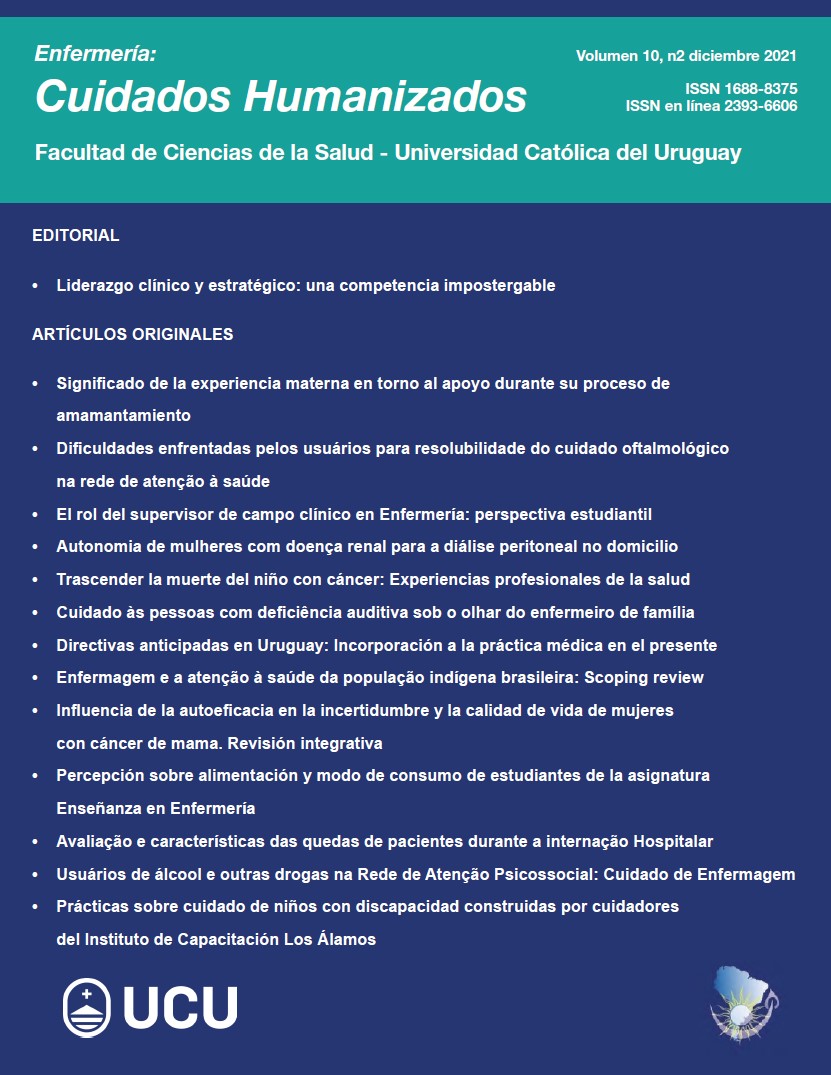Trascender la muerte del niño con cáncer: Experiencias profesionales de la salud
DOI:
https://doi.org/10.22235/ech.v10i2.2410Palabras clave:
apoyo social, duelo, profesionales de la salud, oncología, niñoResumen
Objetivo: Develar la percepción del apoyo en duelo de los profesionales de las unidades de oncología pediátrica, tras el fallecimiento de los pacientes. Método: Estudio fenomenológico cualitativo. Se realizaron 22 entrevistas en profundidad a profesionales de 5 unidades de oncología pediátrica de hospitales públicos de Santiago de Chile. Una vez transcritas las narraciones, se realizó el análisis comprensivo y posteriormente la triangulación de los datos, hasta lograr su saturación. Resultados: Los profesionales se perciben apoyados en su duelo al poder experimentar las pérdidas en un ambiente protegido y sentirse apoyados por su entorno. Reconocen la existencia de factores externos e internos que facilitan el proceso de duelo. Sin embargo, este apoyo se percibe como insuficiente, ya que falta un apoyo formal por parte de la institución, así como un periodo de duelo protegido, o el apoyo de los profesionales de la salud mental a los equipos. Todas las experiencias de muerte permiten a los profesionales trascender su dolor a partir del aprendizaje permanente y dar sentido a su trabajo. Conclusión: El apoyo en duelo que sienten los profesionales se genera a partir de sus propias iniciativas de reencuentro dentro de los equipos, lo cual es insuficiente. Por ello, es necesaria la formación en el afrontamiento de la muerte desde el pregrado, lo que permitiría una mayor cohesión en el afrontamiento y un mayor autocuidado dentro de los equipos.
Descargas
Citas
Coca C, Arranaz P, Diéz-Asper H. Burn-out in the healthcare staff who care for children at the end of their lives and their families. In: Gómez Sancho M, editores. Palliative care in the child. Spain: Lerko/GAFOS;2007.
Chen C, Chow A, Tang S. Bereavement process of professional caregivers after deaths of their patients: A meta-ethnographic synthesis of qualitative studies and an integrated model. INT J NURS STUD. [Internet]. 2018 [citado 2019 May 6];88:104–113. DOI: 10.1016/j.ijnurstu.2018.08.010
Crowe S, Sullivant S, Miller-Smith L, Lantos J. Grief and Burnout in the PICU. Pediatrics. [Internet]. 2017 [citado 2019 Jul 2019];139(5):e20164041. DOI: 10.1542/peds.2016-4041
Internacional Agency for Research on Cancer. Cancer today [Internet]. France: World Health Organization. C2020-2021. [citado 2021 May 25]. Disponible en: https://gco.iarc.fr/today
Vallebuona C. Primer informe del Registro Nacional de Cáncer Infantil de Chile (menores de 15 años), RENSI. [Internet]. Santiago, MINSAL;018. Disponible en: http://www.ipsuss.cl/ipsuss/site/artic/20180117/asocfile/20180117150429/informe_renci_2007_2011registro_nacional_c__ncer_infantildepto_epidemiolog__aminsal2018.pdf
Ferreira A, Becker H, da Graça Corso M, Zanchi D. Palliative care in paediatric oncology: perceptions, expertise and practices from the perspective of the multidisciplinary team. Rev Gaúcha Enferm. [Internet]. 2015 [citado 2019 May 6];36(2):56-62. DOI: 10.1590/1983-1447.2015.02.46299
Papadatou D, Bellali T, Papazoglou I, Petraki D. Greek nurse and physician grief as a result of caring for children dying of cancer. Pediatric Nursing. [Internet]. 2002 [citado 2018 Nov 15];28(4):345-353. PMID: 12226956.
Chew Y Ang S. Shorey S. Experiences of new nurses dealing with death in a paediatric setting: A descriptive qualitative study. J Adv Nurs. [Internet]. 2021 [citado 2021 May 22]; (77): 343–354. DOI: 10.1111/jan.14602
Vega P, González R, Santibáñez N, Ferrada C, Spicto J, Sateler A, Bustos J. Supporting in grief and burnout of the nursing team from pediatric units in Chilean hospitals. Rev Esc Enferm. USP [Internet] 2018 [citado 2019 May 6];51(2):1-6. DOI: 10.1590/s1980-220x2017004303289.
Laor-Maayany R, Goldzweig G, Hasson-Ohayon I, Bar-Sela G, Engler-Gross A, Braun M. Compassion fatigue among oncologists: the role of grief, sense of failure, and exposure to suffering and death. Supportive Care in Cancer. [Internet] 2020 [citado 2021 May 22];1528:2025-2031. DOI: 10.1007/s00520-019-05009-3
Santos A, Santos M. Stress and Burnout at Work in Pediatric Oncology: Integrative Literature Review. Psicol. cienc. prof. [Internet]. 2015 [citado 2018 Nov 15];35(2):437-456. DOI: 10.1590/1982-370300462014
Vega P, González R, López ME, Abarca E, Carrasco P, Rojo L, González X. Perception of support in professional’s and technician’s grief of pediatric intensive care units in public hospitals. Rev Chil Pediatr. [Internet]. 2019 [citado 2020 May 9];90(4):429-436. DOI: 10.32641/rchped.v90i4.1010
Medland J, Howard-Ruben J, Whitaker E. Fostering psychosocial wellness in oncology nurses: addressing burnout and social support in the workplace. Oncol Nurs Forum. [Internet]. 2004 [citado 2018 Nov 15];31(1):47-54. DOI: 10.1188/04.ONF.47-54. PMID: 14722587.
Vega P, González R, Palma C, Oyarzun C, Ahumada E, Mandiola J, Rivera M. Revealing the meaning of the grieving process in pediatric nurses who face the death of a patient due to cancer. AQUICHAN. [Internet]. 2013 [citado 2018 Nov 15];13(1):81-91. DOI: 10.4067/S0370-41062017000500007
Fernández M, García M, Pérez M, Cruz F. Experiences, and obstacles of psychologists in the accompaniment of processes at the end of life. Annals of Psychology. [Internet]. 2013 [citado 2018 Nov 15];16(1):1-8. DOI: 10.6018/analesps.29.1.139121
Betriana F, Kongsuwan W. Nurses’ Grief in Caring for Patients with Advanced Cancer: A Literature Review. Songklanagarind J Nurs. [Internet]. 2019 [citado 2020 Jul 16];39(1):138-4. Disponible en: https://he02.tci-thaijo.org/index.php/nur-psu/article/view/181323
Anderson K, Ewen H, Miles E. The Grief support in Healthcare Scale. Nursing Research. [Internet] 2010 [citado 2018 Nov 16];59(6):372-379. DOI: 10.1097/NNR.0b013e3181fca9de
Wenzel J, Shaha M, Klimmek R, Krumm S. Working through grief and loss: oncology nurses' perspectives on professional bereavement. Oncol Nurs Forum. [Internet]. 2011[citado 2018 Nov 16]; 38(4): 272-282. doi: 10.1188/11.ONF.E272-E282
Husserl E. Ideas related to pure phenomenology. Vol 1. 3rd ed. México: Fondo Cultural de Economía; 1947.
Barbera N, Iniciarte A. Fenomenología y Hermenéutica: dos perspectivas para estudiar las ciencias sociales y humanas. Multiciencias. 2012;12(2):199-205. Disponible en https://www.redalyc.org/pdf/904/90424216010.pdf
Waldenfels B. Fenomenología de la experiencia en Edmund Husserl. ÁRETE Revista de Filosofía. [Internet] 2017. [citado 2021 May 30];29(2):409-426. DOI: 10.18800/arete.201702.008
Streubert H, Carpenter D. Qualitative research in nursing: advancing the humanistic imperative. 4a.ed. Philadelphia: Lippincott Williams & Wilkins;2007.
Johnson S, Rasulova S. Qualitative research and the evaluation of development impact: incorporating authenticity into the assessment of rigour. J Dev Effect. [Internet]. 2017 [citado 2021 May 30];9(2):263–76. DOI: 10.1080/19439342.2017.1306577
Emanuel EJ, Wendler D, Grady C. What makes clinical research ethical? JAMA. [Internet]. 2000 [citado 2021 May 30];283(20):2701-2711. DOI: 10.1001/jama.283.20.2701. PMID: 10819955
Kapoor S, Morgan CK, Siddique MA, Guntupalli KK. "Sacred Pause" in the ICU: Evaluation of a Ritual and Intervention to Lower Distress and Burnout. Am J Hosp Palliat Care. [Internet]. 2018 [citado 2020 May 3];35(10):1337-1341. DOI:10.1177/1049909118768247
Montross-Thomas LP, Scheiber C, Meier EA, Irwin SA. Personally Meaningful Rituals: A Way to Increase Compassion and Decrease Burnout among Hospice Staff and Volunteers. J Palliat Med. [Internet]. 2016 [citado 2020 May 3];19(10):1043-1050. DOI: 10.1089/jpm.2015.0294. PMID: 27337055
Gerow L, Conejo P, Alonzo A, Davis N, Rodgers S, Domian EW. Creating a curtain of protection: nurses' experiences of grief following patient death. J Nurs Scholarsh. [Internet] 2010 [citado 2018 Nov 16];42(2):122-129. DOI:10.1111/j.1547-5069.2010.01343.x
Arribas S, Jaureguizar J, Bernarás E. Satisfacción y fatiga por compasión en personal de enfermería de oncología: estudio descriptivo y correlacional . Enfermería Global. [Internet] 2020 [citado 2020 Dec 3];19,4:120-144. DOI: 10.6018/eglobal.417261.
Wentzel D, Brysiewicz P. Integrative review of facility interventions to manage compassion fatigue in oncology nurses. Oncol Nurs Forum. [Internet]. 2017 [citado 2019 Jun 13];44(3):E124-E140. DOI: 10.1188/17.ONF.E124-E140. PMID: 28635987.
Granek L, Ariad S, Shapira S, Bar- Sela G, Ben-David M. Barriers and facilitators in coping with patient death in clinical oncology. Support Care Cancer. [Internet]. 2016 [citado 2019 May 12];24(10):4219-4227. DOI: 10.1007/s00520-016-3249-4.
Forster E, Hafiz A. Pediatric death and dying: exploring coping strategies of health professionals and perceptions of support provision. Int J Palliat Nurs. [Internet] 2015 [citado 2018 May 22];21(6):294-301. DOI: 10.12968/ijpn.2015.21.6.294. PMID: 26126678.
Macedo A, Mercês NNA, Silva LAGP, et al. Nurses’ Coping Strategies in Pediatric Oncology: An Integrative Review. Rev Fund Care Online. [Internet]. 2019 [citado 2020 May 22];11(3):718-724. DOI: 10.9789/2175-5361.2019.v11i3.718-724
Sullivan CE, King AR, Holdiness J, Durrell J, Roberts KK, Spencer C, et al. Reducing Compassion Fatigue in Inpatient Pediatric Oncology Nurses. Oncol Nurs Forum. [Internet]. 2019 [citado 2020 May 22];46(3):338-347. DOI: 10.1188/19.ONF.338-347. PMID: 31007264.
Robson K, Williams C. Dealing with the death of a long-term patient; ¿what is the impact and how do podiatrists cope? Journal of Foot and Ankle Research. [Internet] 2017 [citado 2018 May 22];10:36. DOI: 10.1186/s13047-017-0219-0
Zheng R, Lee SF, Bloomer MJ. How nurses cope with patient death: A systematic review and qualitative meta-synthesis. J Clin Nurs. [Internet] 2018 [citado 2019 Jul 2];27(1-2):e39-e49. DOI: 10.1111/jocn.13975.
González M, Gallego F, Vargas L, del Águila Hidalgo B, Alameda G, Luque C. The end of life in the Intensive Care Unit from the nurse perspective: a phenomenological study. Enfermería Intensiva. [Internet] 2011 [citado 2018 May 22];22(1):13-21. DOI: 10.1016/j.enfi.2010.11.003
Peters L, Cant R, Payne S, O'Connor M, McDermott F, Hood K, Morphet J, Shimoinaba K. How death anxiety impacts nurses' caring for patients at the end of life: a review of literature. Open Nurs J. [Internet]. 2013[citado 2018 May 22];7:14-21. DOI: 10.2174/1874434601307010014.
Kellogg MB, Barker M, McCune N. The lived experience of pediatric burn nurses following patient death. Pediatr Nurs. [Internet] 2014 Nov-Dec [citado 2018 May 22];40(6):297-301. PMID: 25929125.
Scaratti M, Oliveira DR, Rós ACR, et al. From Diagnosis to Terminal Illness: the Multiprofessional Team Endeavior in Pediatric Oncology. Rev Fund Care Online. [Internet] 2019 [citado 2018 May 22];11(n. esp):311-316. DOI: 10.9789/2175-5361.2019.v11i2.311-316
Carnevale F, Farrell C, Cremer R, Canoui P, Séguret S, Gaudreault J, de Bérail B, Lacroix J, Leclerc F, Hubert P. Struggling to do what is right for the child: Pediatric life-support decisions among physicians and nurses in France and Quebec. Journal of Child Health Care. [Internet]. 2012 [citado 2018 May 22];16(2):109–123. DOI: 10.1177/1367493511420184
Descargas
Publicado
Cómo citar
Número
Sección
Licencia
Derechos de autor 2021 Enfermería: Cuidados Humanizados

Esta obra está bajo una licencia internacional Creative Commons Atribución 4.0.

















